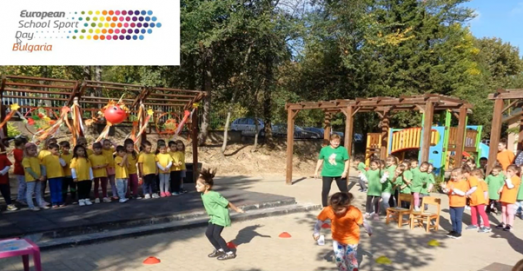European School Sport Day’s expansion to China continues with MOVE Transfer project
18/08/2020By Hilal Erkoca, ISCA

Expanding a successful initiative and rolling it out within a country or to other countries or continents is at the heart of ISCA’s MOVE Transfer concept. The Hungarian School Sport Day expanded its reach in Hungary through MOVE Transfer in 2014, and the Europe-wide model European School Sport Day started being adapted to schools in Asia, Africa and South America from 2018. As part of its expansion to Asia, ISCA hosted an information webinar for MOVE Transfer Europe-China project partners on 12 August 2020.
The European School Sport Day (ESSD) MOVE Transfer Europe-China webinar was held online with 40 people from 14 countries and 18 different organisations joining in remotely. The aim was to equip the participants with the guidance and resources they need to coordinate their own School Sport Day events on 25 September 2020.
The MOVE Transfer Europe-China project started in 2019 and has so far served as a bridge between partners in Europe and institutions in China, Hong Kong and Macau. As lockdowns forced the project’s partners to continue their collaborations online this year, 18 online meetings on different topics have been held since February. The ESSD webinar was a result of the regular meetings of the MOVE Transfer Europe-China project’s working group dedicated to school sport and physical activity, the Active Schools Group, with the aim of making their partnerships sustainable and expanding the scale of the project.
The webinar’s six presenters, from Europe and Macau, China, shared the objective, the history and good examples of School Sport Days held across Europe and Macau.

Guidance and resources for School Sport Day National Coordinators
Anita Király from the Hungarian School Sport Day and European School Sport Day founding organisation the Hungarian School Sport Federation introduced ESSD as an international initiative to promote physical activity at school which is organised on the last Friday of September.
The mission of ESSD is to celebrate sport in school and to help children kick off a lifetime of health. A consortium of partners, including ISCA, EUPEA, Youth Sport Trust International, BG Be Active and V4Sport piloted the first European School Sport Day in 2015 and in 2016, ESSD began to expand further across Europe and establish partners at an international level and an international network.
In 2019 ESSD was held on four continents, Europe, Asia, Africa and South America and the aim is to expand the network even further with new partners and countries.
In her presentation, Anita outlined the tasks of the national coordinators to give MOVE Transfer Europe China project partners valuable insights that will facilitate their work in becoming national School Sport Day coordinators. All resources they received, designed especially for national coordinators, are provided on the ESSD website.
Download the European School Sport Day Toolkit for event organisers here

Bulgarian example: "ESSD provides the flexibility for the schools to design how they would like to organise the day"
As the second presenter of the webinar, Vlad Federov from BG Be Active shared success stories and experiences as the national coordinator for Bulgaria. Vlad noted that each year ESSD is becoming better known and even anticipated by the schools and its participation is steadily rising. He emphasised that one of the reasons why the schools participate in ESSD is the flexibility it offers to the schools. They can decide how they would like to organise the Day and there are no limitations to types of activities (as long as the children are active for at least 120 minutes during the day). A diversity of events is always encouraged by the ESSD organsers.
Vlad pointed out that among the reasons for ESSD Bulgaria’s success is that it is part of a full-year campaign, NowWeMOVE, which engages schools in events at different times of the year, such as No Elevators Day and MOVE Week. They also organise a national award ceremony for the most active schools and focus on PR activities. According to the statistics for 2019, 95,000 students and 12,500 teachers and parents from 400 schools participated in ESSD activities in Bulgaria.
Macau example: "We understand the importance of exchange, empowerment, initiation, ideas, voices and connection"
As the final intervention of the ESSD webinar, Walter Ho from the Faculty of Education, University of Macau, China, shared his experience of implementing School Sport Day in Asia. In the first part of his presentation he explained how they develop physical activities in Macau, underlining the five learning dimensions of the curriculum model and the pedagogical context for learning through physical activities. The five dimensions consist of the Intervention Physical Activities, Games Perception, Decision Making and Thinking Process, Performing and Results.
In the second part of his presentation, Walter stated that they did not have big number of schools participating in the School Sport Day in the beginning. But in 2019-2020, there has been an increase in participation and 14 schools with approximately 3001 students joined the event in Macau in 2019. He underlined that they encourage schools to participate in the event since they “understand the importance of exchange, empowerment, initiation, ideas, voices and connection”.
The ESSD webinar has taken an important first step in terms of informing, encouraging and inspiring the participants of the MOVE Transfer Europe-China Project on the implementation of European School Sport Day. Participants have been encouraged to contact the ISCA office or the Hungarian School Sport Federation for further inquiries on how to join in on 25 September.




